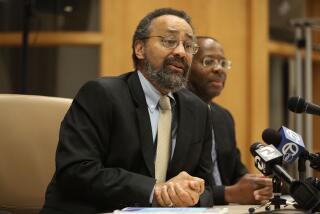Roger Revelle, Oceanographer, UC San Diego Founder, Dies
- Share via
Roger Revelle, the internationally renowned oceanographer whose theories on global warming preceded by years the current debate over the greenhouse effect, the administrator who molded the Scripps Institution of Oceanography into a major research facility and the academic who founded the University of California, San Diego, died Monday.
Revelle died at the UC San Diego Medical Center after suffering a heart attack Wednesday. He was 82.
The lanky, 6-foot, 4-inch scientist is best known in San Diego as the major force behind the difficult struggle to persuade the University of California Board of Regents to build a campus in San Diego.
Revelle became an oceanographer during an era in which nearly every dive brought an exciting discovery, several of them his.
Thirty years before greenhouse effect became a household term, Revelle and another researcher wrote a paper about the effects of carbon dioxide on the climate. Other studies in which he participated are linked to the modern geological theory of tectonic plates.
Gov. Pete Wilson, who knew Revelle from Wilson’s days as San Diego mayor in the 1970s, said, “Roger Revelle is one person who can look back upon his life and say not only that ‘I made a difference,’ but say, ‘I made one hell of a difference.’ ”
But Revelle once said he was “not a great scientist. I am an initiator. . . . Maybe I’m not (as) good at ending things.”
Roger Randall Dougan Revelle was born in Seattle but raised in Pasadena. He earned a degree in geology from Pomona College in Claremont in 1929 and began his graduate work at UC Berkeley.
Attracted by the idea of “being a sailor and a scientist at the same time,” Revelle switched from geology to oceanography in graduate school. “In geology you have to climb cliffs a lot, and I was scared of heights,” he once said of the change.
In 1931, having transferred to the Scripps Institution of Oceanography, he married Ellen Virginia Clark, a La Jolla native and member of the prominent Scripps publishing family for whom the marine institution is named.
During World War II, Revelle served in the Naval Reserve, first in San Diego and then as officer in charge of the oceanographic section of the Bureau of Ships. He helped create the Office of Naval Research, headed its geophysics branch from 1946 to 1948 and was involved in measuring the oceanographic impact of Operation Crossroads, the 1946 atomic bomb tests on Bikini Atoll.
In 1948, Revelle returned to Scripps as associate director and served as director from 1951 to 1964.
During that period, he supervised several expeditions that revealed startling facts about the ocean floor. One study of how heat flowed under the sea led Revelle to suggest that molten material was moving under a thin layer of bedrock. That contributed to the theory of plate tectonics, one of the most important developments in geological science.
Also during this period, Revelle became concerned about the increase in carbon dioxide in the atmosphere caused by the burning of fossil fuels.
In 1957, he and another Scripps researcher, Hans Seuss, wrote that although microscopic organisms on the ocean’s surface absorb carbon dioxide as they grow, the ocean was not going to prove the answer to temperature increases. Revelle would later call himself the “granddaddy” of the theory of global warming.
For three years, starting in 1958, Revelle advocated establishing a UC campus in San Diego. When it became a reality his approach was a novel one: to build a university from the graduate level down. He established the School of Science and Engineering, of which he was dean, and simultaneously built a group of undergraduate colleges.
He would later reflect that among his original goals for UC San Diego was to make it “fully involved with the world . . . neither an ivory tower nor a citadel of learning, but rather a cathedral in the heart of the human city. And, like a cathedral, it would be constantly building and changing, never completed or closed.”
In 1957, he was elected to the National Academy of Sciences, which would later award him its Agassiz Medal for outstanding achievement. Revelle was cited for promoting understanding of oceanic processes and the geology of the sea floor, as well as for “the stimulus he has given, through his research and special efforts, to the advance of scientific oceanography throughout the world.”
But when the UC regents passed over Revelle for the post of UC San Diego chancellor, he took a leave of absence and channeled his energies from the natural sciences to the social ones.
From 1961 to 1963, he served as the first science adviser to Secretary of the Interior Stewart Udall, a job that turned his attention to the problems of poverty in developing countries.
President John F. Kennedy appointed him head of a panel working to help increase agricultural productivity in West Pakistan, where farmers battled the debilitating effects of salt in the soil.
In 1963, he served a brief stint as the University of California’s dean of research for all campuses. Two years later, in a gesture some characterized as a token “gold watch,” the first of UC San Diego’s four colleges was named after Revelle.
By that time, however, Revelle had headed east, to Harvard University. There, he founded and headed the Harvard Center for Population Studies, where he conducted major research on land, water and energy resources as related to population and potential economic development.
In 1975, after 11 years at Harvard, he began splitting his time between that campus and UC San Diego. In 1978, he returned to Scripps permanently.
Revelle is survived by his wife, three daughters, one son, 11 grandchildren and four great-grandchildren.
Times staff writer David Smollar contributed to this story.
More to Read
Sign up for Essential California
The most important California stories and recommendations in your inbox every morning.
You may occasionally receive promotional content from the Los Angeles Times.










